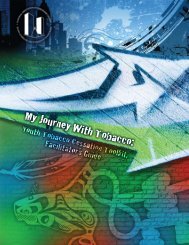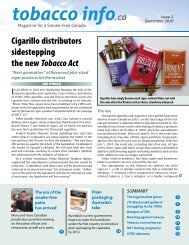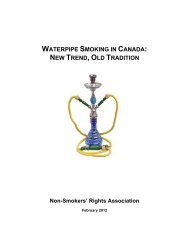Tobacco-Free Sports and Recreation Policies
Tobacco-Free Sports and Recreation Policies - New Brunswick Anti ...
Tobacco-Free Sports and Recreation Policies - New Brunswick Anti ...
Create successful ePaper yourself
Turn your PDF publications into a flip-book with our unique Google optimized e-Paper software.
<strong>Tobacco</strong>-<strong>Free</strong> <strong>Sports</strong> <strong>and</strong> <strong>Recreation</strong> <strong>Policies</strong><br />
Barriers to implementing a TFSR policy in a hockey setting included:<br />
• Player <strong>and</strong> coach turnover was a barrier to maintaining the momentum from year to year.<br />
• Volunteer capacity <strong>and</strong> fatigue was reported by the Women’s league case study.<br />
• Reliance on individual teams <strong>and</strong> individual champions (volunteers) to promote TFSR<br />
policy <strong>and</strong> tobacco-free promotion was also cited as a barrier.<br />
• The need for consistent funding to maintain the local TFSR messaging <strong>and</strong> promotion<br />
(e.g., logos/promotional materials, signage/ advertising, swag for players) was<br />
emphasized across case studies.<br />
Key Lessons of the TFSR policy implementation experiences are:<br />
• Hockey settings (organizations <strong>and</strong> venues) are perceived to be valuable <strong>and</strong> effective<br />
sites to promote TFSR messages across prevention, protection <strong>and</strong> cessation areas.<br />
• Impacts of TFSR policy implementation include a reduction in exposure to second-h<strong>and</strong><br />
smoke.<br />
• People want change, including smokers. There is general agreement that a smoke-free<br />
sports <strong>and</strong> recreation environment is important <strong>and</strong> that a tobacco-free policy does not<br />
infringe upon the rights of tobacco users.<br />
• Change can be achieved but continuous <strong>and</strong> sustained efforts are not easy. Champions at<br />
the local level are vital.<br />
• One of the most salient findings of this evaluation was that TFSR messaging is very<br />
important (e.g., signage, logos). The messaging can help to sustain the momentum of the<br />
TFSR efforts even if the policy itself has received limited to no attention or review within<br />
the hockey team setting.<br />
• A final lesson from the case studies is that implementation <strong>and</strong> long-term change will not<br />
be achieved without a multi-pronged approach (e.g., policy reminders, tobacco-free<br />
events, logos/promotional materials, signage/ advertising, swag for players).<br />
Ontario <strong>Tobacco</strong> Research Unit 3





